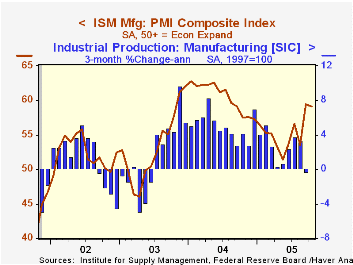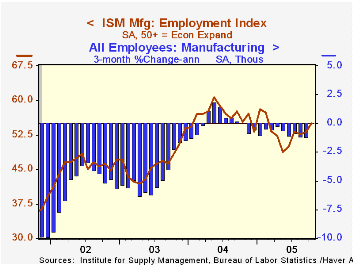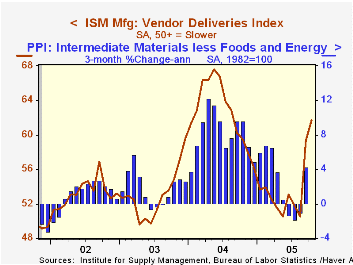 Global| Nov 01 2005
Global| Nov 01 2005ISM Index Firmer Than Expected, Pricing Up
by:Tom Moeller
|in:Economy in Brief
Summary
The October Composite Index of activity in the manufacturing sector remained unexpectedly firm at 59.1, reported the Institute of Supply Management (ISM). The modest decline from 59.4 in September contrasted with Consensus [...]

The October Composite Index of activity in the manufacturing sector remained unexpectedly firm at 59.1, reported the Institute of Supply Management (ISM). The modest decline from 59.4 in September contrasted with Consensus expectations for a drop to 57.0. The last two months have been the highest for the index since the Summer of last year.
During the last twenty years there has been a 64% correlation between the level of the Composite Index and the three month growth in factory sector industrial production.
Three of the index's five components fell in October. New orders gave back 2.1 of the 7.4 point September rise but remained at the second highest level of the year. Production gave back just 1.1 of the 7.2 point spike in September, also to remain at the second highest level of 2005 and inventories also fell to the middle of recent months' range.
Job creation in the factory sector improved as indicated by a rise in the employment index to the highest level since February. During the last twenty years there has been a 67% correlation between the level of the ISM Employment Index and the three month growth in factory sector employment.
The vendor deliveries index, indicating that the pace of vendor deliveries slowed, rose 2.4 points on top of an 8.8 point September rise to the highest level in over one year. During the last ten years there been an 82% correlation between the index and the three month change in the core PPI for intermediate materials.
Improved pricing power in the factory sector was further indicated by a 6.0 point rise in the prices paid index to the highest level since May of last year. Seventy percent of those surveyed indicated success in raising prices, the highest since May '04, while just two percent reported lower prices. From the ISM's latest Report of Business, respondents indicated "We are seeing an increase in the number of chemical products being placed on allocation and order control." (Chemicals), "Concern over the price of oil and its effect on the future prices of commodities. Existing inventories are being depleted and we are seeing some significant price increases in some commodities." (Electronic Components & Equipment), "Most price increase letters I have ever seen." (Instruments & Photographic Equipment) and "Refrigerated freight a significant issue - unable to find available trucks. Sugar prices are skyrocketing." (Food)
The Global Saving Glut and the U.S. Current Account Deficit, an April 2005 speech by then Fed Governor Ben S. Bernanke is available here.
| ISM Manufacturing Survey | Oct | Sept | Oct '04 | 2004 | 2003 | 2002 |
|---|---|---|---|---|---|---|
| Composite Index | 59.1 | 59.4 | 57.5 | 60.5 | 53.3 | 52.4 |
| New Orders Index | 61.7 | 63.8 | 59.3 | 63.5 | 57.9 | 56.5 |
| Prices Paid Index (NSA) | 84.0 | 78.0 | 78.5 | 79.8 | 59.6 | 57.6 |
Tom Moeller
AuthorMore in Author Profile »Prior to joining Haver Analytics in 2000, Mr. Moeller worked as the Economist at Chancellor Capital Management from 1985 to 1999. There, he developed comprehensive economic forecasts and interpreted economic data for equity and fixed income portfolio managers. Also at Chancellor, Mr. Moeller worked as an equity analyst and was responsible for researching and rating companies in the economically sensitive automobile and housing industries for investment in Chancellor’s equity portfolio. Prior to joining Chancellor, Mr. Moeller was an Economist at Citibank from 1979 to 1984. He also analyzed pricing behavior in the metals industry for the Council on Wage and Price Stability in Washington, D.C. In 1999, Mr. Moeller received the award for most accurate forecast from the Forecasters' Club of New York. From 1990 to 1992 he was President of the New York Association for Business Economists. Mr. Moeller earned an M.B.A. in Finance from Fordham University, where he graduated in 1987. He holds a Bachelor of Arts in Economics from George Washington University.
More Economy in Brief
 Global| Feb 05 2026
Global| Feb 05 2026Charts of the Week: Balanced Policy, Resilient Data and AI Narratives
by:Andrew Cates






